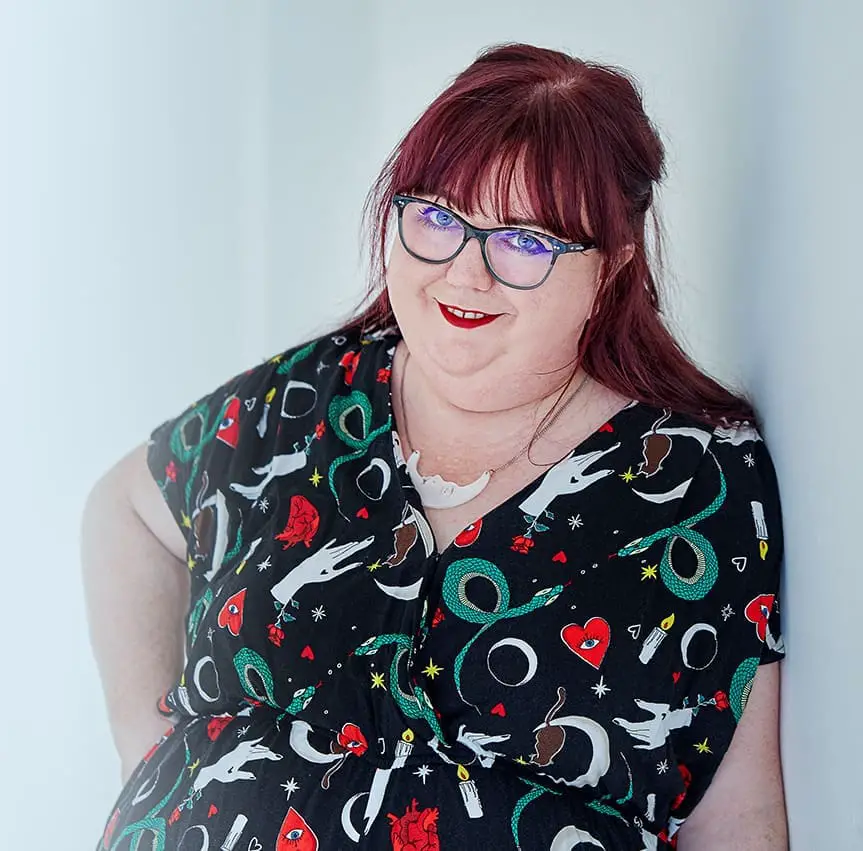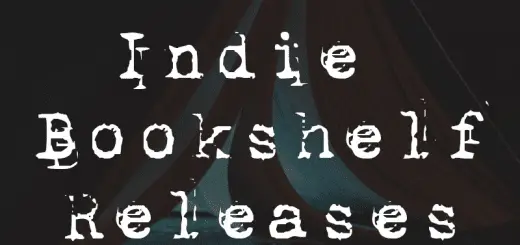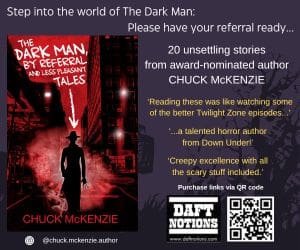An Interview With Author Damon Barret Roe On The Upcoming Magazine The Crow’s Quill
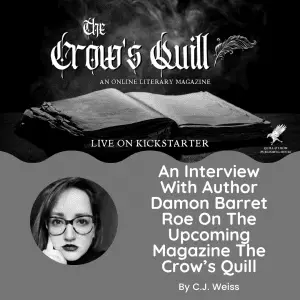 The word “gothic” can conjure very specific images depending on who you’re talking to. Some out there might see Robert Smith very clearly in their mind’s eye, while others will think of heroines in white night dresses fleeing ruined castles by dark. Once the dominant speculative genre – back before Shelley and Stoker and Lovecraft and Orwell were but a sparkle in their mothers’ eyes – Gothic has gone through the trends and the tribulations of genre over the last few centuries.
The word “gothic” can conjure very specific images depending on who you’re talking to. Some out there might see Robert Smith very clearly in their mind’s eye, while others will think of heroines in white night dresses fleeing ruined castles by dark. Once the dominant speculative genre – back before Shelley and Stoker and Lovecraft and Orwell were but a sparkle in their mothers’ eyes – Gothic has gone through the trends and the tribulations of genre over the last few centuries.
And yet, it endures.
It’s the Gothic that drives Quill & Crow Publishing House, a self-described “quaint and curious press dedicated to promoting the integrity of independent literature”. As specialists in all things Gothic and macabre, Quill & Crow not only put out anthologies and novels, they also have a monthly online magazine exploring different themes within the framework of the Gothic genre. With Gothic as the framework, the stories published in The Crow’s Quill invite other genres such as fantasy, horror and literary fiction into the fold.
We sat down with Damon Barret Roe, editor of The Crow’s Quill, to find out more about the enduring appeal of the gothic and macabre, as well as the publishing house’s current Kickstarter campaign to keep the (gentle, candlelit) fires burning for their dreadful tales.
Let’s start with you, Damon: you’re an author and editor. What drives/inspires your work? How long have you been doing it?
 I fell into writing and editing very slowly over the course of my life, with random instances of both during high school and university, but I didn’t properly give it a shot until spring 2021. I hadn’t considered this path until the pandemic. I’d started on a loose novel idea a couple of years prior and being in lockdown for eight months was… well, let’s call it conducive. I wrote a novel, joined a writing Discord, and was dragged kicking and screaming onto Twitter by a valued friend. I didn’t think I was the type to thrive on social media but it’s the root of all my current projects, achievements, and endeavours.
I fell into writing and editing very slowly over the course of my life, with random instances of both during high school and university, but I didn’t properly give it a shot until spring 2021. I hadn’t considered this path until the pandemic. I’d started on a loose novel idea a couple of years prior and being in lockdown for eight months was… well, let’s call it conducive. I wrote a novel, joined a writing Discord, and was dragged kicking and screaming onto Twitter by a valued friend. I didn’t think I was the type to thrive on social media but it’s the root of all my current projects, achievements, and endeavours.
And that community feeling? That’s what drives me. It probably sounds ridiculously trite but helping people is what really makes me happy. Helping them polish their ideas and craft is a damn joy, especially when they come away from the editing experience feeling like they’ve learned something about their work, skills, and goals. It’s what I enjoy about being edited myself so I try to give others that experience.
As for inspiration, I’m much the same as most authors: I’m inspired by life in general, but particularly the extreme highs and the devastating lows. And maybe also my inner child. She’s a dark, creepy little thing.
How did you become an editor? What was your pathway?
My pathway was the definition of unconventional. As I mentioned, the writing community on Twitter is the root of everything. It’s where I found most of my friends, colleagues, and mutuals.
I’d had some editing experience throughout my academic years but I wanted to learn more. So I tossed a random tweet into the void, saying I wanted more editing experience and the Quill & Crow staff saw it. They took me under their wings, taught me the ropes, threw me into the deep end, and trusted me to learn everything else. After proving myself a fast-learner and hard-worker, I earned their faith. Of course, I’m still learning, and they continue to teach me, but I feel pretty confident in what I do now. Which is hilarious to me because not one year ago, I would tell me writer friends, “I wish I could help with edits but I’m not going to be any good at it.” I still make mistakes but I know I’m leaps and bounds ahead of where I was a year ago.
The “editor” can be a scary thought for writers, particularly those starting out: what do you feel an editor brings to the table?
Well, besides feedback from fresh eyes, good editors will help you through the process. It’s absolutely terrifying to get your work back covered in red but it’s so necessary. You have to carve the bark to create the art. Editors will help you whittle your idea into the piece you want it to be, and it doesn’t have to be scary if you’re open to it. I think, as creatives, we suffer a lot for the pride and passion we put into this and sometimes we’ll see that red line as a strike against us. But it isn’t, it really isn’t. It’s just a streamlining process, and good editors will give you encouragement and explanations for the red often and consistently. We’ll also be open to discussing edits: nothing’s set in stone until the process is over (and even then, not necessarily). Editors and writers are symbiotic, I think; we have to learn how the other works, what the other is trying to say, and how we can compromise for the sake of the story.
I love the process now that I’ve been on both ends. If you can set aside your insecurities and pride to just re-read that edited sentence, you’ll know if it’s right for the story you want to tell. Trust your editor but trust your gut too.
What’s it actually like to be a publication editor, dealing with submissions?
Oof, it’s easy but it’s hard. I absolutely love sifting through submissions because I get to read dozens upon dozens of stories I’ve never heard before. Sometimes they’re life-changing and live rent-free in my head, sometimes they’re jarring and frightening for the right reasons. Sometimes for the wrong ones. But the process is fascinating and thrilling.
The part that sucks is having to pick the ones we want to publish. I’ve had to reject a few that I deeply wanted but didn’t fit what we were looking for. We’ve had some masterful pieces submitted to themes that were just not present in the story. And it’s upsetting because I love my authors (the ones I’ve edited—I collect them like they’re each the One Ring and I’m Gollum) and I’ve had to reject them too. It’s not just strangers I have to say no to, and not knowing them isn’t easier. As a writer myself, I know what it’s like to love your piece and have faith in it and be rejected, and to have to cause that pain—however brief—always hurts.
That being said, overall, it’s a process I do love. I try to hold onto the feeling of helping when I get to send out an acceptance. I’ve been lucky enough to be the one to say to new authors, “Yes, I believe in you, I want to help you put this story out there.” There’s magic in it, I think.
How did you get involved with Quill & Crow Publishing house?
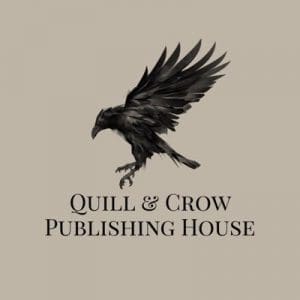 A friend in the writing community shares her poetry quite often, and last year, I saw her using a hashtag on each one. I didn’t understand what it was, so I asked her and she explained: #CrowCalls is a hashtag created by Quill & Crow to showcase Gothic poetry in the community and encourage people to explore the art with daily prompts. I’d written a handful of poems in my life and the prompt aspect intrigued me. I tried my hand at it fairly regularly for a while and some of it caught crows’ eyes: they contacted me and asked to publish a couple of my pieces in Crow Calls Volume III. Naturally, I rode that high for a while!
A friend in the writing community shares her poetry quite often, and last year, I saw her using a hashtag on each one. I didn’t understand what it was, so I asked her and she explained: #CrowCalls is a hashtag created by Quill & Crow to showcase Gothic poetry in the community and encourage people to explore the art with daily prompts. I’d written a handful of poems in my life and the prompt aspect intrigued me. I tried my hand at it fairly regularly for a while and some of it caught crows’ eyes: they contacted me and asked to publish a couple of my pieces in Crow Calls Volume III. Naturally, I rode that high for a while!
After that, I engaged more with fellow poets and writers, and found a community within the community. The rest is random-tweet-about-editing history.
Tell us a bit about The Crow’s Quill: where did it come from, and what are you doing with it?
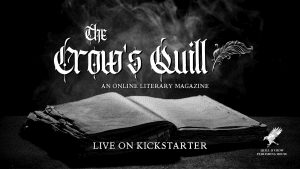 So the magazine is actually the brain-baby between Cassandra L. Thompson herself and our previous Assistant Editor, William Bartlett. It was a labor of love they created to give more writers the opportunity to put their work out there and spread the Gothic genre. It’s also another way to share dark poetry.
So the magazine is actually the brain-baby between Cassandra L. Thompson herself and our previous Assistant Editor, William Bartlett. It was a labor of love they created to give more writers the opportunity to put their work out there and spread the Gothic genre. It’s also another way to share dark poetry.
A couple of issues into the magazine’s life, William had to step away to focus on other responsibilities, and because they loved the project so much and didn’t want to give up on it, I was asked to step in. I was terrified of the responsibility but William had been teaching me all about it for weeks and I felt like it was an opportunity that landed on my doorstep for a reason. So, I took it.
I’ve run the project for close to a year now and I have goals to keep going and keep improving. I want to put it on the map, I want to make it a competitive standard. I want our authors and poets to feel like getting a yes from us is a little dream come true, and for people to delve into Gothic and dark genres more and more. We’re a tiny team who make it happen but we love it and we want to nurture it.
What do you look for in submissions to The Crow’s Quill? What’s likely to get your attention or stand out from the crowd?
Well, every month is a different theme, naturally, and that’s all the prompting I give besides the obvious ‘give us Gothic, literary, dark fantasy, horror, etc’ stories. At the magazine, we only publish fiction, and only works that run parallel to Gothic. If we get science-fiction submissions, for example, I’ll very likely reject because it’s not what we do.
For stories that do fall into the right genres, I expect the theme to be hit. Sometimes, writers submit stories that hinge on the vaguest connection to the theme. In these cases, unless the writing is spectacular, I’m likely to reject. I prioritize stories that complement the concept—or even each other, in some cases—and paint stunning, original imagery. I particularly love twisted stories and purple prose. I know encouraging overwrought writing is probably a faux pas but I can’t help it! I live for sentences that are rich and heavy on the tongue. Sometimes I want the writing to force me to re-read a sentence because I’ve missed a layer.
Balanced writing gets my attention just as much, though. Writing where, yes, descriptions and such can be rich and overwrought, but the dialogue is clean, relatable, believable. If I can understand the character’s personality within the first paragraph, or get the feel for the atmosphere in that same time, I’m probably going to be hooked.
For anyone reading who might be interested in submitting, one pet-peeve that always makes me hesitate is the overuse of dialogue tags. Cut them out if they add nothing!
Who would you like to hear from in your submissions? Any particular groups of writers you want to see more of?
I try not to play favorites but queer stories always make me so happy. Being pan and not having realized I could express myself through writing for the longest time, it makes my heart happy to give that opportunity to others. I also want to help more and more POC voices get out there so I want to see stories that are steeped in other cultures, about experiences that are so often drowned out by white, heteronormative ones. My particular weakness is stories based in folklore and local legends, so anyone with a deep, abiding love for their culture is going to catch my attention.
And you’re running a Kickstarter – how can people pledge/get involved?
 Besides literally pledging on our Kickstarter page, one thing that’s helped us so much already is spreading the word on social media. Quill & Crow has accounts on Twitter, Instagram, and TikTok, and the majority of our backers have found us through those. Likes, retweets, comments are all immensely helpful!
Besides literally pledging on our Kickstarter page, one thing that’s helped us so much already is spreading the word on social media. Quill & Crow has accounts on Twitter, Instagram, and TikTok, and the majority of our backers have found us through those. Likes, retweets, comments are all immensely helpful!
Engage with us, talk about it, ask questions. It gets eyes on us and helps us work out any kinks we may not have noticed.
What is it about Gothic that you love?
The drama of it. The way it sucks me into that dark, dreary atmosphere even if the sun is out, birds are chirping, and all is right in my world. I love being transported into thrilling stories that keep the hair on my nape standing on end, or make my heart hurt and ache, hoping for the characters to succeed. I love being along for the ride on downward spirals into insanity and the unknown. Make me question everything, even my empathy. That’s something that Gothic does well when it’s done right. Not only Gothic, of course, but it’s that love for purple prose that goes hand-in-hand with it that puts it up there on my most-loved genre list.
Why do you think Gothic endures?
The drama of it. Seriously, it gets us all, doesn’t it? I believe morbid curiosity lurks in all of us, maybe not always, but there’s always something that’s going to get our attention. Maybe it’s ghosts or grief, maybe it’s murder or a twisted romance, but there’s something in it for everyone. We’re curious mammals and what’s more curious than the inexplicable and frightening? What’s more curious than events powerful enough to send us into melancholy with just a few words? It’s a study on human nature and the darkness in us, our experiences, and the world. That darkness is a constant and, thus, Gothic fiction is enduring.
Anything else you’d like to share or make sure we cover?
Yes, just quickly: for anyone intrigued by The Crow’s Quill and Quill & Crow Publishing House, we now include trigger warnings in our works, and for anyone interested in submitting, we appreciate the same in queries!
If You’d Like To Follow Damon or Quill & Crow, check out the following links:
For Quill & Crow Publishing House:
Magazine kickstarter: http://kck.st/
Website: https://www.
Twitter: @quillandcrow
Instagram: @
TikTok: @
For Damon Barret Roe:
Website: https://damonbarretroe.com
Twitter, IG, TikTok: @moonbornewriter
- About the Author
- Latest Posts
Lauren McMenemy wears many hats: Editor-in-Chief at Trembling With Fear for horrortree.com; PR and marketing for the British Fantasy Society; founder of the Society of Ink Slingers; curator of the Writing the Occult virtual events; writers hour host at London Writers Salon. With 25+ years as a professional writer across journalism, marketing, and communications, Lauren also works as a coach and mentor to writers looking to achieve goals, get accountability, or get support with their marketing efforts. She writes gothic and folk horror stories for her own amusement, and is currently working on a novel set in the world of the Victorian occult. You’ll find Lauren haunting south London, where she lives with her Doctor Who-obsessed husband, the ghost of their aged black house rabbit, and the entity that lives in the walls.

